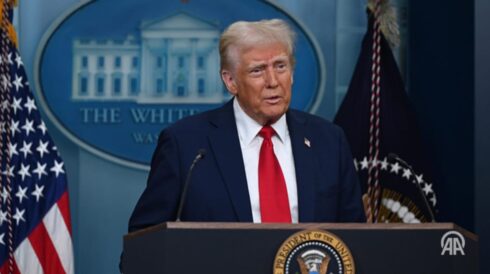Driving through the village of Delta, Ohio, a town of just over 3,000 residents tucked in the state’s northwestern corner, the political leaning is unmistakable. Trump flags flutter proudly alongside the American stars and stripes, and gas stations still bear stickers mocking President Joe Biden. This is solid Trump country, where the former president won in a landslide during the last election.
Here, support for Donald Trump goes beyond politics — it’s cultural. Many residents see his trade policies, including this week’s sweeping announcement of new tariffs ranging from 10% to 50% on global imports, as necessary measures to protect American workers and revive domestic industry. While Wall Street reacts nervously, Delta’s citizens see opportunity and fairness.
“I don’t want people in other countries to suffer,” says Mary Miller, owner of the Delta Candy Emporium. “But we need to have an even playing field.” Miller, a loyal Trump supporter, embodies the prevailing sentiment in Delta — that foreign competitors have long taken advantage of the U.S. and that now, finally, something is being done about it.
Betting on American Industry Over Wall Street Woes
Though financial markets have tumbled since the tariff announcement, residents like Gene Burkholder, a longtime agricultural worker, remain calm. “Nobody’s frantic,” he said. “We’re not going to lose sleep over it.” Burkholder sees a silver lining in the market dip — a chance to buy stocks at a discount.
That sentiment is echoed in the Barn Restaurant, a local gathering spot where steelworkers sipping morning beers brushed off economic concerns. Despite working in a sector directly impacted by global supply chains, the workers expressed little anxiety, reflecting a belief that Delta’s manufacturing base — especially its steel industry — might actually benefit from protectionist policies.
Nearby steel firm North Star BlueScope, a key local employer, has both backed broader tariffs and sought exemptions for essential raw materials like scrap metal. The dual stance underscores the complexity of global trade even in a town eager to see more “Made in America” labels.
Tariffs Stir Mixed Feelings, But Action Wins Praise
Not all voices in Delta are blindly loyal to Trump, but even skeptics admit they appreciate action. Louise Gilson, dining with her son Rob, voiced reservations about Trump’s trustworthiness. Yet, when another customer remarked, “Trump may be wrong, but at least he’s trying,” she nodded in agreement. “The other people wouldn’t have done squat,” she said, referencing the Democratic Party.
Their view reflects a broader feeling of abandonment. Over decades, the Gilsons have witnessed the gradual decline of small-town life — shrinking job opportunities, increasing inequality, and the loss of a close-knit community spirit. Amid this backdrop, Trump’s tariffs represent, for many, a bold attempt to reverse years of industrial erosion.
Even with concerns about whether the economic benefits will be fairly shared, residents express hope that revitalizing American industry could restore some of the town’s lost vitality.
Memories of Decline Drive Support for Trade Reset by Trump administration
Delta’s industrial past remains vivid in the memories of older residents. Once a thriving town with safe streets and steady employment, many now describe a place diminished by globalization and corporate relocations. Rob Gilson recalled how Delta “was a good little town to grow up in,” but he believes its heart has faded with time.
For people like Mary Miller, this erosion began when major American brands — like Levi’s — moved manufacturing abroad. She hasn’t bought a pair of Levi’s since, a personal boycott reflecting deeper discontent with international trade practices. “Sometimes you have to walk through fire to get to the other side,” she said. “If tariffs bring companies and business back to hard-working American people, then it’s worth it.”
This emotional connection to American-made products and distrust of foreign goods isn’t just nostalgia — it’s a driving force behind support for Trump’s aggressive trade approach.
Protectionism Resonates Where Globalization Has Faltered
In Delta, as in many industrial towns across the Midwest, the narrative is clear: the global economy has not been kind. While economists warn of rising consumer prices and supply chain disruptions, those risks seem distant compared to the tangible hope of jobs returning and factories reopening.
Residents readily acknowledge the potential downsides but remain optimistic. There is a pervasive belief that Trump’s tariffs are not just about economics — they are a statement of national pride and fairness. Even those wary of Trump’s character or intentions concede that, for once, someone is listening to the forgotten towns of America.
In the end, Delta’s embrace of tariffs reflects more than support for a policy — it’s a cry for recognition, a yearning for revival, and a gamble that protectionism might offer what free trade hasn’t: a fair shot for America’s heartland.














